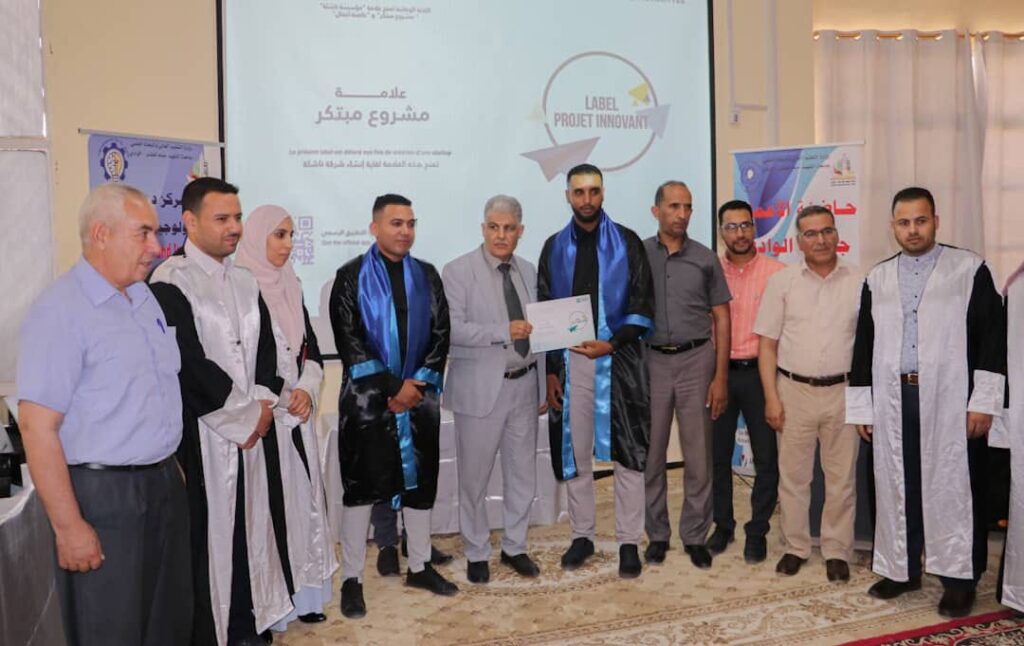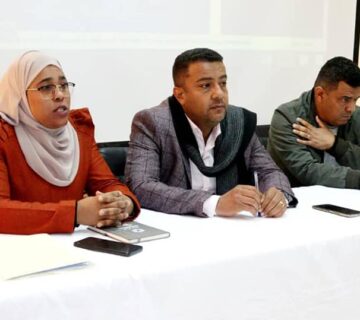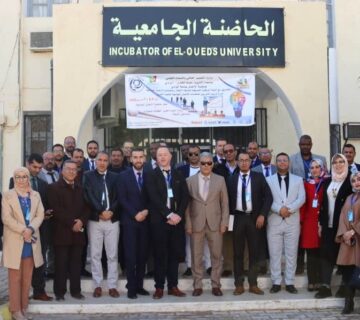Innovation: Smart Cane, Talking Glasses for the Blind, and a Cargo Transport Application
On June 6, 2023, students Khayari Ahmed Khayari and Mahmoud Aiba from the Faculty of Technology at the University of Shahid Hamma Lakhdar presented their Master’s degree thesis within the framework of the Start-up-Patent Innovation Enterprise, in accordance with Ministerial Decree 1275. The thesis focused on three inventions developed by the students:
A cargo transport application that received the trademark (label) for student Khayari Ahmed Khayari.
An innovative project consisting of two smart devices developed jointly by the aforementioned student and student Mahmoud Aiba: a smart cane and talking glasses for the benefit of the blind.
The discussion session was attended by the University President, Professor Omar Ferhati, the Vice President for External Relations, Professor Habib Qaddah, the Director of the Business Incubator, Mohamed Fouad Ferhat, and a number of professors, students, and their parents.
The discussion committee consisted of six members:
Committee Chair: Dr. Shoaib Al-Abyad
Examiners: Dr. Misbah Al-Awamer and Dr. Mansouri Khaled, representative of the incubator.
Student supervisors: Dr. hakima cherif and her assistant Dr. Alak Nesiba
Economic partner: Representative of the Directorate of Solidarity and Social Activity.
Before the discussion session, the University President gave a speech in which he praised the students’ achievements and their research projects, which he said have been transformed into patents that benefit society, whether those related to the (Safir) application for transporting goods or the smart cane and talking glasses for the blind. He also praised the work of the committee supervising the evaluation of the students’ research project and the important role played by the Director of the Incubator in supporting and accompanying the projects of start-up-patent enterprises within the framework of the strategy of the Ministry of Higher Education and Scientific Research. He pledged to provide all the material, moral, and pedagogical support to help students achieve their goals and transform the university into an element contributing to economic and social development by solving many of the problems posed through these innovative projects.
Dr. Hakima Sharif, the supervisor of the students’ graduation thesis, which received a grade of excellence, explained that the first invention by student Khayari Ahmed Khayari, the Ambassador application, which can be downloaded via the internet, is designed to help customers transport their goods easily from anywhere. The application connects the person who wants to transport their goods with the driver, who requests the chosen means of transport in minutes and contacts them with their location, destination, type of load, weight, distance, and estimated arrival time. The customer can then choose the appropriate price.
She explained that the customer first creates a free account and then registers their personal information (name, surname, number, email and password), which is stored in the application. When they enter the application, they choose the vehicle they want, the type of goods and the area, and this is sent to the driver. The driver then looks at the request and sends the price determined for the type of load to the customer, who can then approve it and have it transported to the specified location.
She pointed out that the inventor has received investment offers from economic operators in Oran, the capital and the Sultanate of Oman.
The second and third inventions are shared by student Khayari Ahmed Khayari with student Mahmoud Aiba. They are two intelligent systems for the benefit of the blind. The first is a smart cane with an ultrasonic sensor that can detect obstacles and send warning signals to the blind person through sound and ringing. The second invention is a smart glasses equipped with a camera that works with artificial intelligence. The camera captures images of obstacles and then identifies them using a pre-trained artificial intelligence algorithm. The name of the obstacle is then converted into sound that the blind person can listen to through a headset connected to the glasses.
On the sidelines of the discussion session, the incubator organized a technology exhibition of the most important innovations developed by the students as part of the innovative projects. The university president, his deputy in charge of external relations, members of the discussion committee, professors, students and their parents attended the exhibition and were impressed by the innovations developed by the students of the University of Wadi.
Tagged #Mubtakirousm Label.



